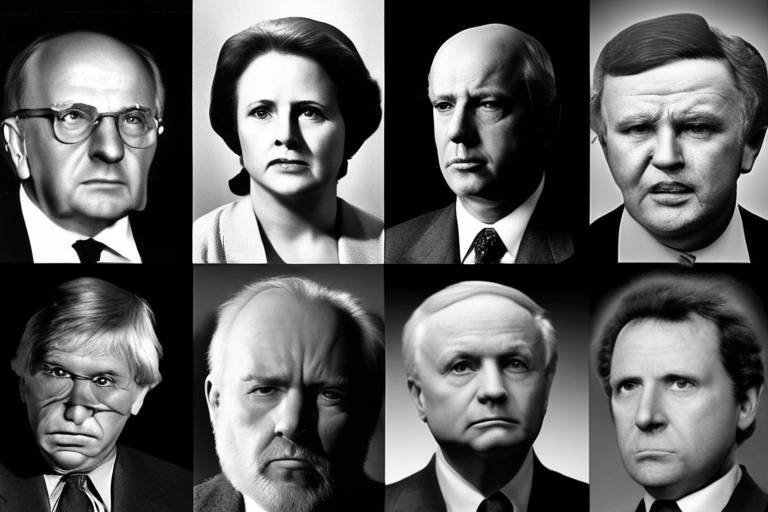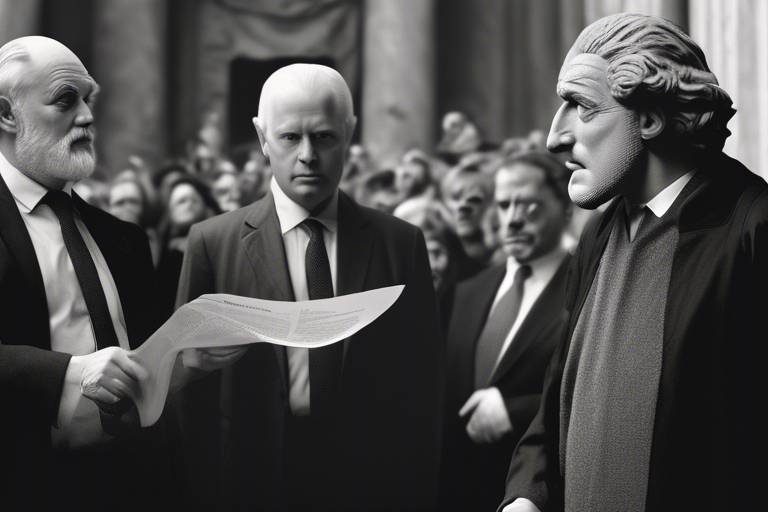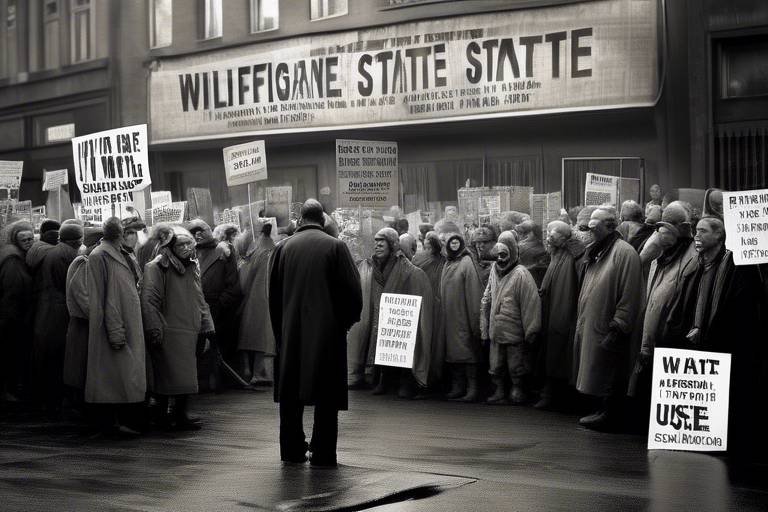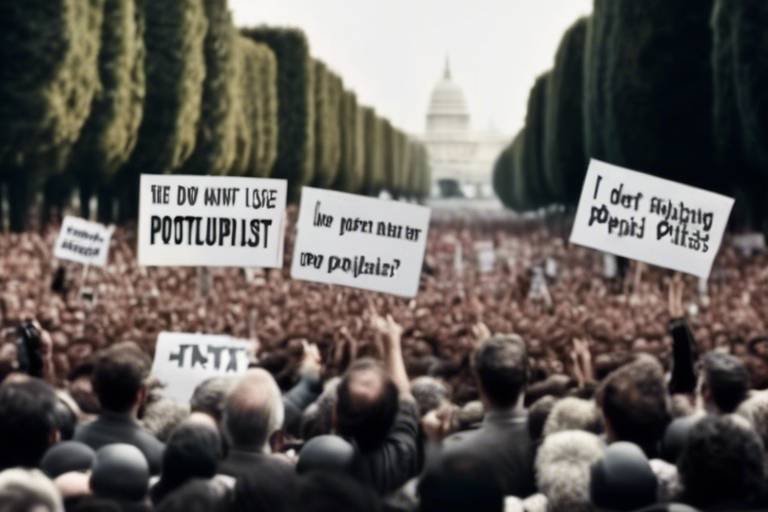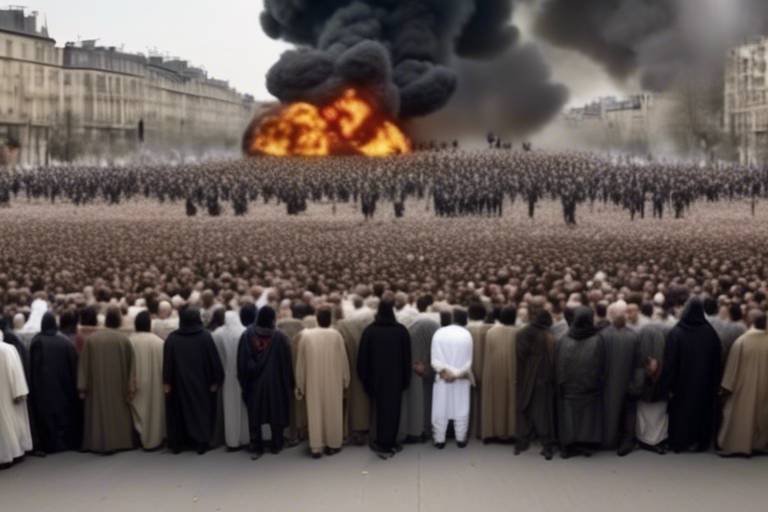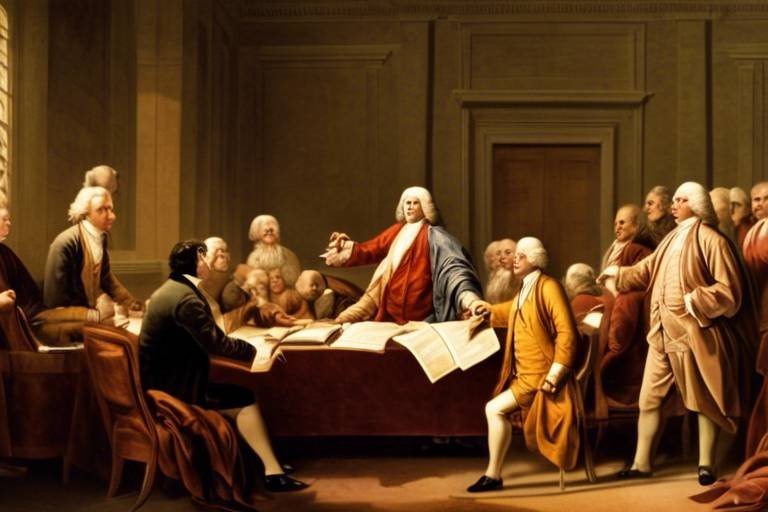Has the Evolution of Politics Outpaced Philosophy?
The intricate dance between politics and philosophy has been a defining feature of human civilization. As societies evolve, so do the frameworks that govern them, leading us to ponder: has the rapid evolution of political landscapes outstripped the slower, more deliberate pace of philosophical thought? This question is not merely academic; it strikes at the heart of how we understand governance, rights, and the very fabric of societal change. In today's world, where political events unfold at lightning speed and social movements gain momentum overnight, one might wonder if philosophical discourse can keep pace with the urgent demands of contemporary political realities.
To grasp this dynamic relationship, we must first delve into the historical context of politics and philosophy. For centuries, these two domains have influenced each other, with philosophers providing the ideological underpinnings for political systems and, conversely, political developments prompting philosophical inquiry. Thinkers like Plato and Aristotle laid the groundwork for political theory, while the tumult of revolutions and reforms has often led to a reevaluation of philosophical principles. This cyclical interplay raises an intriguing question: can philosophy adapt quickly enough to address the complexities of modern governance?
As we explore this theme, it's essential to recognize the key philosophical theories that have shaped political ideologies. From liberalism's emphasis on individual rights to conservatism's focus on tradition and social order, these frameworks have provided a lens through which we can analyze political behavior and institutional structures. Socialism, with its advocacy for collective ownership and social welfare, also challenges the status quo, reminding us that philosophical thought can inspire radical change. Yet, as we witness the rise of populism and identity politics, one might argue that these movements often operate outside the traditional philosophical paradigms, suggesting a potential disconnect between the two fields.
Moreover, the influence of Enlightenment thinkers cannot be overstated. Figures such as John Locke and Jean-Jacques Rousseau revolutionized our understanding of democracy and governance. Locke's ideas on natural rights and government by consent are foundational to liberal democracy, while Rousseau's concept of the social contract has profoundly influenced modern democratic theory. Their works raise important questions about the role of the individual in society and the legitimacy of political authority. However, can these age-old concepts still hold water in the face of contemporary challenges like climate change, economic inequality, and global pandemics?
In the digital age, technology has further complicated the relationship between politics and philosophy. Social media has transformed how we engage with political issues, enabling rapid dissemination of information and fostering grassroots movements. Yet, this immediacy often comes at the expense of thoughtful discourse, leading to a cacophony of voices that can drown out reasoned debate. The ethical implications of data privacy and surveillance also pose significant challenges, prompting philosophical discussions about individual rights in an increasingly monitored society. As we navigate this brave new world, the question remains: can philosophy provide the ethical frameworks necessary to guide us through these turbulent waters?
As we look to the future, the relationship between politics and philosophy is poised for further evolution. The challenges we face today—be it in terms of social justice, environmental sustainability, or global governance—demand innovative philosophical responses. The adaptability of philosophy will be tested as it seeks to address these pressing issues while remaining relevant in a rapidly changing political landscape. Will philosophical inquiry be able to critique and inform emerging political realities, or will it be left in the dust as politics continues to evolve at a breakneck pace?
In conclusion, the interplay between politics and philosophy is as dynamic as ever. While politics may seem to outpace philosophy at times, the latter's enduring relevance cannot be dismissed. As we forge ahead, the dialogue between these two fields will be crucial in shaping a just and equitable society. After all, in the words of the great philosopher Socrates, "The unexamined life is not worth living." It is this examination that will ensure that philosophy remains a vital part of our political discourse.
- How do politics and philosophy influence each other?
Politics and philosophy have a symbiotic relationship; philosophical ideas often shape political ideologies, while political events can prompt new philosophical inquiries. - What are some key philosophical theories in politics?
Key theories include liberalism, conservatism, and socialism, each offering distinct perspectives on governance and societal organization. - Can philosophy keep up with modern political challenges?
While philosophy may not always keep pace with rapid political changes, it remains essential for providing ethical frameworks and critical analysis of contemporary issues. - How has technology impacted political engagement?
Technology, particularly social media, has transformed political communication, allowing for rapid information sharing but also raising concerns about the quality of public discourse.

The Historical Context of Politics and Philosophy
The relationship between politics and philosophy is as old as civilization itself, with roots stretching back to ancient societies. Understanding this historical context is crucial for grasping how these two disciplines have influenced each other over time. In essence, politics can be viewed as the practical application of philosophical ideas, while philosophy serves as a lens through which to critique and understand political systems.
In ancient Greece, philosophers like Plato and Aristotle laid the groundwork for political thought. Plato's vision of an ideal state, governed by philosopher-kings, proposed that the most knowledgeable should lead, emphasizing the importance of wisdom in governance. In contrast, Aristotle took a more empirical approach, categorizing different political systems and advocating for a mixed government that balanced the interests of various social classes. Their dialogues sparked debates that resonate even today, highlighting the enduring quest for the best form of governance.
Fast forward to the Middle Ages, where the interplay between religion and politics became pronounced. Thinkers like St. Augustine and Thomas Aquinas explored the divine right of kings and the moral obligations of rulers, intertwining theological principles with political authority. This era set the stage for the Renaissance, a period that rekindled interest in classical philosophy and humanism, leading to new political theories that emphasized individual rights and the social contract.
The Enlightenment further revolutionized political thought, giving rise to influential figures such as John Locke, Jean-Jacques Rousseau, and Montesquieu. Their ideas about democracy, freedom, and the social contract challenged traditional notions of authority and governance. Locke's assertion that government derives its legitimacy from the consent of the governed laid the foundation for modern liberal democracy, while Rousseau's concept of the general will emphasized collective decision-making. These Enlightenment thinkers not only shaped political structures but also inspired revolutions and reforms across the globe.
As we moved into the 19th century, the rise of industrialization and capitalism brought about new philosophical inquiries. Thinkers such as Karl Marx critiqued the socio-economic conditions of their time, arguing for a revolutionary change to dismantle oppressive systems. This led to the emergence of various political ideologies, including socialism and liberalism, each responding to the evolving needs of society. The historical context of politics and philosophy is not just a timeline of events; it is a rich tapestry of ideas that continue to influence contemporary thought.
To summarize, the historical interplay between politics and philosophy reveals a dynamic relationship that has evolved through various epochs. Each philosophical movement has left its mark on political theory and practice, shaping the governance structures we see today. As we navigate the complexities of modern governance, understanding this historical context allows us to appreciate the philosophical underpinnings that continue to inform our political landscape.
- How have ancient philosophers influenced modern political thought?
Ancient philosophers like Plato and Aristotle laid the groundwork for political theory, advocating for governance based on wisdom and empirical observation, respectively. - What role did the Enlightenment play in shaping contemporary politics?
The Enlightenment introduced ideas of democracy, individual rights, and the social contract, profoundly impacting modern political ideologies and systems. - How do philosophy and politics interact today?
Philosophy continues to critique and inform political practices, addressing contemporary issues such as inequality, technology, and governance ethics.

Key Philosophical Theories in Politics
The landscape of politics is a tapestry woven from various philosophical theories that have emerged over centuries, each contributing its unique thread to our understanding of governance and societal organization. At the core of political philosophy lie three primary theories: liberalism, conservatism, and socialism. Each of these frameworks offers distinct perspectives on individual rights, the role of the state, and the nature of justice, shaping political ideologies and practices across different societies.
Liberalism advocates for individual freedoms and equal rights, emphasizing the importance of personal autonomy and democratic governance. Rooted in Enlightenment ideals, liberalism posits that the state should exist to protect the rights of individuals, allowing them to pursue their own paths. This philosophy has given rise to modern democratic systems that prioritize civil liberties and the rule of law. Notably, liberalism has evolved into various branches, including classical liberalism, which champions minimal state intervention, and social liberalism, which supports a more active role for the government in addressing social inequalities.
In contrast, conservatism emphasizes tradition, social stability, and the importance of established institutions. Conservative thinkers argue that change should be approached with caution, as rapid shifts can lead to societal upheaval. They believe that the wisdom of the past should guide current policies, fostering a sense of continuity and community. This theory often prioritizes the collective over the individual, advocating for a strong state that maintains order and upholds cultural values. Furthermore, conservatism can manifest in various forms, such as fiscal conservatism, which focuses on economic prudence, and social conservatism, which seeks to uphold traditional moral values.
On the other hand, socialism challenges the tenets of both liberalism and conservatism by advocating for collective ownership and egalitarianism. Socialists argue that capitalism inherently leads to inequality and social injustice, proposing that the means of production should be owned and regulated by the community or the state. This philosophy has inspired numerous political movements and governments, from democratic socialism, which seeks to combine political democracy with social ownership, to more authoritarian forms of socialism that emphasize state control. The ongoing debates surrounding socialism often center on the balance between freedom and equality, questioning how best to achieve a just society.
To illustrate the differences and similarities among these philosophies, the following table summarizes their core principles:
| Philosophy | Core Beliefs | View on State Role |
|---|---|---|
| Liberalism | Individual rights, freedom, democracy | Protects individual freedoms, minimal intervention |
| Conservatism | Tradition, social stability, order | Maintains order and upholds cultural values |
| Socialism | Collective ownership, equality, social justice | Active role in regulating economy and resources |
As we navigate the complexities of modern governance, it becomes evident that these philosophical theories are not just relics of the past; they are living frameworks that continue to shape political discourse today. The interplay between these ideologies can be seen in contemporary political movements, where activists often draw from a mix of these theories to address pressing social issues. For instance, the rise of social justice movements reflects a blend of liberal and socialist principles, advocating for both individual rights and collective action against systemic inequalities.
Ultimately, understanding these key philosophical theories is crucial for anyone seeking to engage with the political landscape. They provide a lens through which we can critically analyze policies and movements, helping us discern the underlying values that drive political decisions. As we move forward, the dialogue between these philosophies and the evolving political context will undoubtedly continue to spark debates, challenge assumptions, and inspire new ideas for governance.
- What is the main difference between liberalism and socialism? Liberalism emphasizes individual freedoms and rights, while socialism focuses on collective ownership and social equality.
- How do conservative values influence modern politics? Conservative values often promote tradition and stability, advocating for policies that maintain social order and cultural heritage.
- Can these philosophies coexist in a political system? Yes, many contemporary political systems incorporate elements from multiple philosophies to address diverse societal needs.

Influence of Enlightenment Thinkers
The Enlightenment era, often dubbed the Age of Reason, was a time when the seeds of modern democracy were sown, and the influence of its thinkers cannot be overstated. These intellectual giants, such as John Locke, Jean-Jacques Rousseau, and Voltaire, challenged the status quo and provided frameworks that shaped political thought for centuries. They were like the architects of a new world, laying down the blueprints for governance that emphasized reason, individual rights, and social contracts. Their ideas not only sparked revolutions but also ignited a flame of inquiry that still burns brightly in contemporary discussions about politics and society.
One of the most significant contributions of Enlightenment thinkers was the emphasis on rationality and individualism. They argued that human beings are capable of reason and should be treated as such, leading to a reevaluation of authority and governance. For instance, John Locke's notion of natural rights posited that individuals possess inherent rights to life, liberty, and property, which the government must respect. This idea laid the groundwork for liberal democracy and influenced the drafting of foundational documents like the U.S. Declaration of Independence and the French Declaration of the Rights of Man and of the Citizen.
Rousseau, on the other hand, brought forth the concept of the social contract, which emphasized the collective will of the people. His assertion that legitimate political authority comes from the consent of the governed challenged the divine right of kings and provided a philosophical basis for modern democratic governance. This idea resonates strongly today, as movements advocating for popular sovereignty and civic engagement continue to echo Rousseau's call for a government that reflects the will of its people.
Moreover, the Enlightenment thinkers were not just theorists; they were also activists in their own right. They believed in the power of education and enlightenment as tools for societal change. Voltaire's advocacy for freedom of speech and religious tolerance highlighted the importance of dialogue and dissent in a healthy democracy. Their ideas fostered an environment where questioning authority was not just accepted but encouraged, paving the way for future generations to challenge oppressive systems.
As we navigate the complexities of modern politics, the influence of these Enlightenment thinkers remains palpable. Their philosophies continue to inform debates on civil rights, governance, and the role of the state in individual lives. Just as a tree grows from a strong root system, contemporary political thought is deeply rooted in the ideas propagated during the Enlightenment. It raises an intriguing question: have we truly built upon their foundations, or are we merely echoing their voices in a different context?
In summary, the Enlightenment thinkers were instrumental in shaping the political landscapes we see today. Their legacy is a testament to the power of ideas in driving societal change. As we reflect on their contributions, it's essential to recognize that their philosophies are not relics of the past but living concepts that continue to evolve and challenge us in our pursuit of a just and equitable society.
- What was the Enlightenment? The Enlightenment was an intellectual movement in the 17th and 18th centuries that emphasized reason, individualism, and skepticism of traditional authority.
- Who were the key figures of the Enlightenment? Important figures included John Locke, Jean-Jacques Rousseau, Voltaire, and Immanuel Kant, among others.
- How did Enlightenment thinkers influence modern democracy? They introduced concepts such as natural rights, social contracts, and the importance of individual freedoms, which have become foundational to modern democratic systems.
- What is the social contract theory? The social contract theory posits that individuals consent to form a government that will protect their rights and promote the common good.

John Locke's Contributions
John Locke, often hailed as the father of liberal democracy, made profound contributions that have shaped modern political thought. His ideas on natural rights and the concept of government by consent laid the foundational principles for democratic governance. Imagine a world where the authority of rulers is not absolute but derives from the consent of the governed; this was Locke's revolutionary proposition. He argued that every individual possesses inherent rights to life, liberty, and property, which the government must protect. This notion of rights being inalienable and universal has echoed through history, influencing countless revolutions and democratic movements.
Locke's philosophy is encapsulated in his seminal work, Two Treatises of Government, where he delineates the purpose of government as safeguarding individual rights. What makes his argument compelling is the idea that if a government fails to protect these rights, the people have not just the right but the duty to overthrow it. This radical thought has inspired many, from the American Revolution to contemporary discussions about civil disobedience and social justice. Locke's emphasis on reason and rationality in governance also paved the way for the Enlightenment thinkers who followed him, creating a rich tapestry of ideas that challenged the status quo.
Furthermore, Locke's social contract theory introduced the idea that political authority is not a divine right but a mutual agreement among individuals to form a society. This concept has led to a more democratic view of governance, where power is derived from the people rather than imposed from above. To illustrate this, consider the following table that summarizes his key contributions:
| Concept | Description |
|---|---|
| Natural Rights | Life, liberty, and property are inherent rights that must be protected by the government. |
| Government by Consent | Legitimate government authority comes from the consent of the governed. |
| Right to Revolt | People have the right to overthrow a government that fails to protect their rights. |
| Social Contract | Political authority is based on a mutual agreement among individuals. |
In conclusion, John Locke's contributions extend far beyond his time, resonating in modern political discourse and practice. His ideas challenge us to reconsider the relationship between the individual and the state, emphasizing that governance should be a reflection of the people's will. As we navigate contemporary political landscapes, Locke's legacy serves as a reminder of the enduring power of philosophical thought in shaping our understanding of governance and societal change.
- What are John Locke's main ideas? Locke's main ideas include natural rights, government by consent, the right to revolt, and the social contract theory.
- How did Locke influence modern democracy? His theories laid the groundwork for liberal democracy, emphasizing individual rights and the importance of consent in governance.
- What is the significance of the social contract? The social contract is significant as it shifts the source of political authority from divine right to the agreement of the governed.

Rousseau's Social Contract
Jean-Jacques Rousseau's concept of the social contract is a cornerstone of modern political philosophy. In his seminal work, "The Social Contract," Rousseau argues that legitimate political authority arises from a social agreement among individuals rather than from divine right or coercion. This revolutionary idea challenged the traditional notions of governance in the 18th century and laid the groundwork for contemporary democratic thought.
At the heart of Rousseau's argument is the belief that individuals are born free and equal, but society often imposes constraints that lead to inequality and oppression. He posits that to achieve true freedom, individuals must collectively agree to form a community where they can pursue their common interests. This collective agreement is what Rousseau terms the general will, representing the collective desires and needs of the people.
Rousseau's social contract is not merely a theoretical framework; it has profound implications for how we understand governance and citizenship today. By advocating for popular sovereignty, Rousseau emphasizes that the authority of the government must derive from the consent of the governed. This idea resonates deeply in modern democracies, where the legitimacy of political power hinges on the will of the people. To illustrate this concept, consider the following key points:
- Popular Sovereignty: The idea that the people hold the ultimate power in a political system.
- Collective Will: The general will is an expression of the common good, transcending individual interests.
- Freedom through Community: True freedom is achieved when individuals come together to form a society that reflects their shared values.
Rousseau's social contract also critiques the inequalities that arise from property ownership and social stratification. He argues that the establishment of private property has led to competition, envy, and conflict, undermining the very essence of community. By proposing a social contract, Rousseau envisions a society where individuals prioritize the common good over personal gain, fostering a sense of belonging and mutual responsibility.
In contemporary discussions about governance, Rousseau's ideas remain relevant as we grapple with issues of representation, justice, and civic engagement. His vision challenges us to reflect on the nature of our political institutions and the extent to which they serve the collective interests of society. As we navigate the complexities of modern politics, Rousseau's social contract serves as a reminder that the foundation of any just society lies in the active participation and consent of its citizens.
- What is the main idea of Rousseau's social contract? Rousseau's social contract posits that legitimate political authority arises from an agreement among individuals to form a community that reflects their collective will.
- How does Rousseau's idea of the general will influence modern democracy? The general will emphasizes that political authority should derive from the consent of the governed, a principle central to democratic governance today.
- What are the implications of Rousseau's critique of private property? Rousseau argues that private property leads to inequality and conflict, suggesting that a just society prioritizes the common good over individual wealth.

Modern Political Movements
In recent years, we have witnessed a surge in that are not only reshaping political landscapes but also echoing the philosophical principles that have guided societies for centuries. These movements often emerge from grassroots activism, driven by a collective desire for social justice, equality, and accountability. One striking feature of these movements is their ability to harness the power of technology and social media, which has become a double-edged sword—enhancing communication while also complicating traditional political discourse.
Take, for instance, the Black Lives Matter movement. Originating in response to systemic racism and police brutality, it has galvanized millions around the world to advocate for racial justice. This movement is deeply rooted in philosophical concepts of human rights and equality, drawing upon the works of thinkers like Martin Luther King Jr. and Angela Davis. The way this movement has utilized social media to spread awareness and mobilize supporters is a testament to the evolving nature of political engagement in our digital age.
Similarly, the Me Too movement has spotlighted issues of gender inequality and sexual harassment, challenging the status quo and demanding accountability from institutions that have historically protected perpetrators. This movement not only reflects a shift in societal attitudes but also raises profound philosophical questions about power dynamics, consent, and justice. As individuals share their stories online, they contribute to a larger narrative that questions existing power structures and advocates for a more equitable society.
Moreover, the rise of environmental activism, exemplified by movements like Fridays for Future, initiated by young climate activist Greta Thunberg, underscores the urgent need for political action in response to climate change. This movement is grounded in ethical considerations about our responsibility to future generations and the planet. It challenges politicians and policymakers to reconsider their priorities, urging them to adopt sustainable practices that align with a philosophical understanding of our interconnectedness with nature.
These modern political movements demonstrate that while political frameworks may evolve, the underlying philosophical principles remain relevant. They remind us that philosophy is not merely an academic exercise; it is a living, breathing discipline that informs and shapes our understanding of justice, rights, and governance. As we navigate the complexities of contemporary issues, the interplay between political action and philosophical thought becomes increasingly vital. The challenge lies in ensuring that these movements do not just spark temporary change but foster a deeper, more sustained engagement with the philosophical questions that underpin our society.
As we look to the future, it is essential to consider how these movements will continue to influence political ideologies and practices. Will they lead to a more profound transformation in governance, or will they be co-opted by existing power structures? The answers to these questions may very well depend on our ability to integrate philosophical inquiry into our political discourse, ensuring that the voices of the marginalized are heard and that justice prevails.
- What are modern political movements? Modern political movements are organized efforts by groups of people to promote or resist social change, often focusing on issues like social justice, climate change, and equality.
- How do these movements relate to philosophy? Many modern political movements draw upon philosophical principles such as justice, rights, and equality to advocate for change and challenge existing power structures.
- Can social media influence political movements? Yes, social media plays a crucial role in modern political movements by facilitating communication, mobilizing supporters, and raising awareness of social issues.
- What is the role of grassroots activism? Grassroots activism is essential for modern political movements as it empowers individuals at the community level to advocate for change and influence political discourse.

The Role of Technology in Politics
The landscape of politics has undergone a radical transformation with the advent of technology, fundamentally altering how we engage with governance and each other. Imagine a world where political debates happen not just in town halls or on television but also in the palm of your hand. This is the reality we live in today, where technology serves as both a tool and a battleground for political discourse. From social media platforms to digital voting systems, technology has reshaped the way we participate in democracy, raising exciting yet complicated questions about the implications for our political systems.
One of the most significant impacts of technology on politics is the rise of social media as a platform for political communication. Gone are the days when political campaigns relied solely on traditional media outlets. Now, candidates and activists can reach millions in an instant, sharing their messages, rallying support, and mobilizing grassroots movements. However, this rapid dissemination of information comes with its own set of challenges. Misinformation spreads just as quickly, creating a chaotic environment where the truth can be obscured. This challenges traditional philosophical notions of public discourse, where informed debate and rational dialogue were once the gold standards.
Moreover, the role of technology extends beyond communication; it also encompasses the mechanics of political participation itself. Digital platforms have enabled new forms of engagement, such as online petitions and crowdfunding for political causes. These innovations empower citizens to take action in ways that were previously unimaginable. However, they also raise questions about accessibility and equity. Not everyone has the same access to technology, and this disparity can create a divide in political participation. For instance, those without reliable internet access may find themselves sidelined in a political landscape that increasingly prioritizes digital engagement.
As we delve deeper into the relationship between technology and politics, we must also consider the ethical implications surrounding data privacy and surveillance. In an age where personal data is a valuable currency, governments and corporations often collect vast amounts of information on individuals. This raises critical philosophical debates about individual rights versus state power. Are we sacrificing our privacy for the sake of security and convenience? The answers to these questions are complex and require careful consideration of the balance between technological advancement and ethical governance.
In summary, technology's role in politics is multifaceted and ever-evolving. It has the potential to enhance democratic engagement but also poses significant challenges that we must navigate carefully. As we continue to embrace technological innovations, it is crucial to reflect on how these changes align with our philosophical principles regarding governance, individual rights, and the collective good.
- How has social media changed political campaigns?
Social media allows candidates to communicate directly with voters, share their messages instantly, and mobilize supporters, but it also facilitates the spread of misinformation. - What are the ethical concerns regarding technology in politics?
Key concerns include data privacy, surveillance, and the potential for unequal access to political participation. - Can technology enhance democratic engagement?
Yes, technology can empower citizens through online platforms for petitions and crowdfunding, but it also risks excluding those without access to digital tools.

Social Media and Political Discourse
In today's fast-paced digital world, social media has emerged as a game changer in the realm of political discourse. Gone are the days when political debates were confined to the halls of government or the pages of newspapers. Now, with just a few taps on a smartphone, anyone can share their thoughts, rally support, or launch a campaign. This democratization of information has both positive and negative implications for how we engage with politics.
On one hand, social media platforms like Twitter, Facebook, and Instagram have provided a voice to the voiceless, allowing grassroots movements to gain traction and mobilize supporters at an unprecedented scale. For instance, movements such as Black Lives Matter and #MeToo have utilized social media to raise awareness and foster community engagement. These platforms have transformed how **political messages** are crafted and disseminated, making it easier for individuals to connect with like-minded people and advocate for change.
However, this new landscape is not without its challenges. The speed at which information spreads can lead to the rapid dissemination of misinformation and propaganda. In a world where a tweet can go viral in minutes, the line between fact and fiction often blurs. This phenomenon raises critical questions about the credibility of information and the impact it has on public opinion. Are we becoming more informed citizens or simply echo chambers for our existing beliefs?
Moreover, the algorithms that govern social media platforms can create filter bubbles, where users are only exposed to viewpoints that align with their own. This can stifle healthy debate and hinder the development of a well-rounded political perspective. The very nature of social media encourages quick reactions and sound bites over thoughtful discourse, which can lead to a superficial understanding of complex political issues.
As we navigate this evolving landscape, it's essential to consider how social media is reshaping our political conversations. Are we witnessing a revolution in political engagement, or are we simply trading one form of discourse for another? The answers to these questions will not only shape our understanding of democracy but also influence how we approach political engagement in the future.
- How has social media changed political engagement? Social media has made it easier for individuals to participate in political discourse, share their views, and mobilize support for various causes.
- What are the downsides of social media in politics? The rapid spread of misinformation, the creation of echo chambers, and the prioritization of sensationalism over substantive discussion are significant concerns.
- Can social media positively influence political movements? Yes, social media has played a crucial role in amplifying grassroots movements and providing a platform for marginalized voices.
- What should individuals do to ensure they are informed? It's essential to verify information from multiple sources, engage with a variety of viewpoints, and critically assess the credibility of the information consumed.

Data Privacy and Ethics
The intersection of technology and politics has ushered in a new era of challenges, particularly concerning data privacy and ethics. As we navigate through a digital landscape where personal information is constantly collected and analyzed, the question arises: how much of our privacy are we willing to sacrifice for convenience and connectivity? It's a dilemma that many of us face daily, as we weigh the benefits of technology against the potential risks to our personal freedoms.
Data privacy is no longer just a buzzword; it has become a fundamental concern for individuals and governments alike. With the rise of social media, online shopping, and digital communication, our personal data has become a valuable commodity. Companies and governments are collecting vast amounts of information, often without our explicit consent. This has led to a growing public outcry for more stringent regulations and ethical standards in data handling.
Ethics in data privacy is a complex issue that raises numerous questions. For instance, should individuals have the right to control their personal information? What happens when data is misused? These questions are critical as they touch on the very essence of personal autonomy and trust in our institutions. To illustrate the current landscape of data privacy, consider the following table that highlights key events and regulations aimed at protecting individual privacy:
| Year | Event/Regulation | Description |
|---|---|---|
| 1998 | Data Protection Act | Introduced in the UK, this act was designed to protect personal data processed by organizations. |
| 2018 | GDPR | The General Data Protection Regulation came into effect in the EU, setting strict guidelines on data protection and privacy. |
| 2020 | California Consumer Privacy Act | This law enhances privacy rights for residents of California, giving them more control over their personal information. |
As we examine these developments, it’s clear that the ethical implications of data privacy are profound. The rise of surveillance technologies raises concerns about how much power governments and corporations wield over individuals. Is it ethical for a government to monitor its citizens under the guise of security? This question challenges the very foundation of democratic societies, where personal freedoms are paramount.
Moreover, the rapid advancement of artificial intelligence (AI) and machine learning technologies further complicates the data privacy landscape. These technologies often rely on vast datasets to function effectively, but they also pose significant risks of bias and discrimination. For instance, algorithms trained on flawed data can perpetuate existing inequalities, leading to ethical dilemmas that require urgent attention. The need for ethical guidelines in AI development is becoming increasingly clear, as society grapples with the implications of automated decision-making.
In conclusion, the conversation surrounding data privacy and ethics is more relevant than ever. As technology continues to evolve, so too must our understanding of its implications on our rights and freedoms. Engaging in this dialogue is crucial, as it not only shapes policy but also influences how we perceive our relationship with technology in our daily lives. Are we prepared to demand accountability from those who handle our data? The answer to this question will shape the future of our digital existence.
- What is data privacy? Data privacy refers to the proper handling, processing, storage, and usage of personal information to protect individuals' rights.
- Why is data privacy important? It is crucial for maintaining trust between individuals and organizations, as well as protecting personal freedoms and preventing misuse of information.
- How can individuals protect their data? Individuals can protect their data by using strong passwords, being cautious about sharing personal information online, and utilizing privacy settings on social media platforms.
- What are the main regulations governing data privacy? Key regulations include the GDPR in Europe, the Data Protection Act in the UK, and the California Consumer Privacy Act in the US.

Philosophy's Response to Political Challenges
In an ever-evolving political landscape, philosophy stands as a beacon, adapting and responding to the myriad challenges that arise. As we face issues such as inequality, climate change, and global governance, philosophical frameworks provide the tools necessary to dissect and understand these complexities. Just like a skilled craftsman uses various tools to shape raw materials into something meaningful, philosophers utilize their theories to mold our understanding of pressing political issues.
Take, for instance, the issue of inequality. Philosophers like John Rawls have profoundly influenced our thinking about justice and fairness. His theory of the "veil of ignorance" encourages us to consider societal structures from a position of impartiality, where we do not know our own social standing. This thought experiment prompts us to advocate for policies that ensure fairness and equity, compelling political systems to address the disparities that plague our societies.
Similarly, the urgent challenge of climate change has ignited philosophical debates about our moral responsibilities toward future generations and the planet. Philosophers such as Peter Singer argue for a utilitarian approach, urging us to consider the greatest good for the greatest number, which includes non-human entities and ecosystems. This perspective not only shapes environmental policy but also inspires grassroots movements that demand action from political leaders.
In the realm of global governance, the rise of transnational issues—like migration, trade, and international conflict—has necessitated a philosophical reevaluation of sovereignty and democracy. Philosophers are now exploring concepts such as cosmopolitanism, which advocates for a global citizenship that transcends national boundaries. This philosophical stance challenges traditional notions of state power and encourages a more inclusive approach to governance that prioritizes human rights and global cooperation.
Moreover, the intersection of technology and politics has opened up new avenues for philosophical inquiry. With the advent of social media and digital communication, questions about data privacy and surveillance have become paramount. Philosophers are engaging in critical discussions about the ethical implications of technology on individual rights and state power. For instance, debates surrounding the balance between national security and personal privacy echo through the halls of philosophical discourse, urging us to reflect on what it means to be free in a digital age.
As these challenges continue to unfold, philosophy remains a vital part of the conversation, offering insights and frameworks that help us navigate the complexities of modern governance. It acts as a compass, guiding us through the murky waters of political dilemmas and encouraging us to think critically about the implications of our choices. In this way, philosophy not only responds to political challenges but also enriches our understanding of the human experience within the political sphere.
- How does philosophy help us understand political challenges? Philosophy provides frameworks and theories that help us analyze and address complex issues like inequality, climate change, and governance.
- What is the role of ethics in political philosophy? Ethics in political philosophy helps us evaluate the moral implications of political decisions and actions, guiding us toward just and equitable policies.
- Can philosophy influence political movements? Yes, philosophical ideas often underpin political movements, inspiring activists and shaping the discourse around social justice and governance.

Future Directions: Politics and Philosophy
As we stand on the precipice of a rapidly changing world, the relationship between politics and philosophy is more crucial than ever. With the rise of global challenges such as climate change, social inequality, and technological disruption, the interplay between these two fields is evolving in ways that demand our attention. Philosophical inquiry is not just an abstract exercise; it is a vital tool for understanding and critiquing the political realities we face today. So, how can philosophy adapt to inform the political landscape of tomorrow?
One potential direction is the increasing integration of interdisciplinary approaches. By combining insights from philosophy with those from sociology, psychology, and even economics, we can develop a more nuanced understanding of political phenomena. For instance, the philosophical concept of justice can be enriched by empirical research into social behavior, leading to policies that are not only theoretically sound but also practically effective. This blending of disciplines could pave the way for innovative solutions to age-old problems.
Moreover, the rise of digital democracy presents a new frontier for philosophical exploration. As technology reshapes how we engage with politics—from online voting to social media activism—philosophers can play a pivotal role in examining the ethical implications of these changes. Questions about data privacy, surveillance, and the authenticity of online discourse are just a few areas where philosophical thought can provide clarity. How do we ensure that technology serves democracy rather than undermines it? This is a question that philosophers must grapple with as we navigate the complexities of the digital age.
Furthermore, the global nature of today's challenges calls for a rethinking of traditional political boundaries. The concept of global citizenship is gaining traction, prompting philosophical discussions about the responsibilities we hold not just to our local communities but to the world at large. This shift could lead to new frameworks for governance that prioritize global cooperation over national interests, challenging us to rethink how we define justice and equity on a planetary scale.
In addition, the ongoing discourse surrounding social justice continues to evolve, with philosophy providing a foundation for movements advocating for marginalized voices. Philosophers can contribute to these discussions by critically analyzing the principles underlying social justice initiatives, ensuring that they are grounded in robust ethical frameworks. This engagement can help shape policies that not only address immediate concerns but also foster long-term societal change.
As we look to the future, one thing is clear: the dialogue between politics and philosophy must continue to adapt and grow. By remaining open to new ideas and embracing the complexities of our world, both fields can inform and enrich one another. The questions we face may be daunting, but they also present an opportunity for profound transformation. How we choose to engage with these questions will determine the trajectory of our political and philosophical landscapes in the years to come.
- How can philosophy influence modern political movements?
Philosophy provides the ethical frameworks and critical perspectives that can guide modern political movements, ensuring they are grounded in principles of justice, equity, and human rights. - What role does technology play in the future of politics and philosophy?
Technology reshapes political engagement and discourse, prompting philosophical inquiry into ethical implications, data privacy, and the authenticity of democratic processes. - Why is interdisciplinary collaboration important for politics and philosophy?
Combining insights from various fields allows for a more comprehensive understanding of complex political issues, leading to innovative and practical solutions. - What are the implications of global citizenship for political philosophy?
Global citizenship challenges traditional notions of national identity and responsibility, prompting philosophical discussions about our duties to the global community and the nature of justice on a worldwide scale.
Frequently Asked Questions
-
How has political evolution influenced philosophical thought?
The evolution of politics has significantly shaped philosophical thought by introducing new concepts and challenges that require philosophical scrutiny. As societies change, philosophers adapt their theories to address emerging political realities, ensuring that philosophical frameworks remain relevant in understanding governance and societal dynamics.
-
What are some key philosophical theories that have shaped politics?
Key philosophical theories such as liberalism, conservatism, and socialism have profoundly influenced political ideologies and practices. Each of these frameworks provides a different lens through which we can understand governance, rights, and the role of the state, reflecting the diverse values and beliefs within societies.
-
How did Enlightenment thinkers impact modern politics?
Enlightenment thinkers like John Locke and Jean-Jacques Rousseau laid the groundwork for modern democratic principles. Locke's ideas on natural rights and Rousseau's social contract theory challenged traditional authority and promoted the concepts of individual rights and popular sovereignty, which are cornerstones of contemporary political systems.
-
What role does technology play in contemporary political discourse?
Technology, particularly social media, has transformed how political discourse occurs. It allows for rapid information sharing and grassroots activism but also raises concerns about misinformation and the quality of public debate. This shift challenges traditional philosophical notions of discourse and democratic engagement.
-
How do philosophical principles address modern political challenges?
Philosophy offers frameworks for understanding and addressing complex issues like inequality, climate change, and global governance. By applying philosophical inquiry, we can critically analyze these challenges and explore ethical considerations, ensuring that philosophical thought remains integral to contemporary political discussions.
-
What is the future relationship between politics and philosophy?
The future relationship between politics and philosophy is likely to evolve as political landscapes change. Philosophical inquiry will continue to inform and critique emerging political realities, helping to navigate the complexities of governance in an increasingly interconnected world.

